Honey For Face: 15 Easy DIY Remedies For Glowing Skin
Adding just a bit of this nectar to your home remedies will work wonders for your skin.
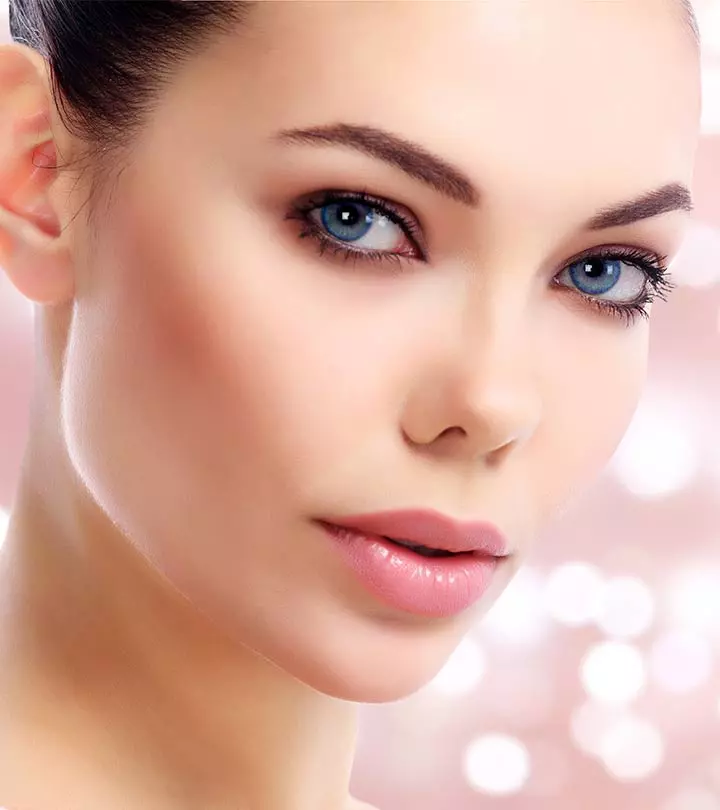
Image: Shutterstock
Honey is one of the most nutritionally rich natural ingredients. It is beneficial for your health and has been a part of DIY skin care remedies. Many people use honey for glowing skin and maintaining a soft, hydrated, and plump look. In addition, the natural enzymesi Biological catalysts or proteins that speed up the metabolism or chemical reactions in the cells of living organisms. present in honey make it a crucial skin care ingredient. That is why you will also find honey in many skin care products.

Honey has anti-inflammatory, antimicrobial, and wound-healing properties (1). If you have a bottle of honey at your home, you can easily use it for your skin. We will tell you how. Scroll down to learn the benefits of honey for skin and check out 15 easy DIY remedies you may try.
In This Article
Honey For Face: Is It Good? What Are The Benefits?
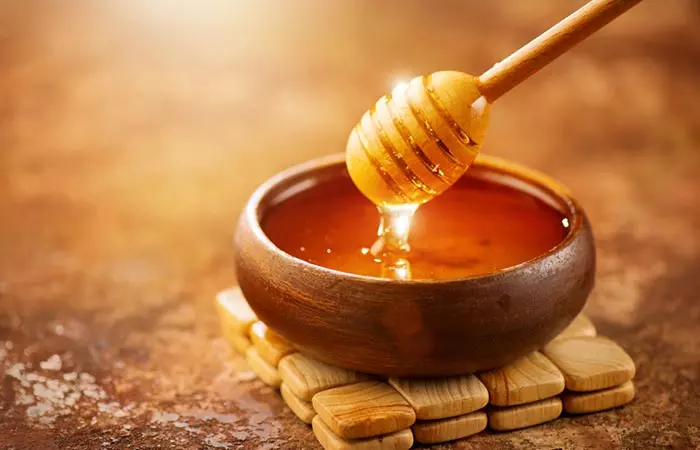
Honey, especially unpasteurized raw honey and Manuka honey, is considered excellent not only for your health but also for topical application. This is because:
1. Honey Can Heal Acne
Applying honey for acne is an effective natural remedy to soothe and reduce breakouts.
In-vitro studies have found that honey has antibacterial properties and can inhibit the growth of many dermatologically important microbes.
They include P. acnes and S. aureus that cause acne. S. aureus can also cause atopic dermatitisi Also known as eczema, a chronic disease that causes inflammation, dryness, redness, and itchy patches on the skin. and other skin infections (2).
2. It Heals Wound And Has Therapeutic Effects
Honey contains enzymes, amino acids, minerals, and vitamins that make it perfect for therapeutic uses.
It can heal minor burns and wounds and is effective for soothing skin issues, such as skin psoriasisi An autoimmune condition that causes skin inflammation, leading to red, itchy, scaly patches commonly on knees, elbows, and scalp. , dandruff, and diaper dermatitis (3).
3. It Keeps Your Skin Moisturized
Honey is an excellent emollient and humectant and can bind moisture to your skin (3). Hence, it is widely used in moisturizing creams and lotions. You can use honey for dry skin as it keeps it hydrated, soft, and supple and reduces any irritation, itching, and flaking.
4. Honey Helps Maintain Skin pH
Honey helps to regulate the pH of your skin and prevent any kind of infection (3). The low pH of honey inhibits the growth of a lot of pathogens and helps wounds heal faster.
Now that you know how honey can help your skin, scroll down below to learn more about how to apply honey on your face (raw or Manuka honey) to keep your skin glowing and healthy.
Key Takeaways
- Honey is a natural ingredient that can help trap moisture in the skin and make it soft.
- A mixture of honey and banana can help keep the skin clear and prevent breakouts.
- Combinations of honey with tomato, yogurt, and avocado as homemade face masks can help improve skin health.
- Never go for overnight application of honey on your face and always do a patch test before using honey.
How To Use Honey For Face: DIY Remedies
 Quick Tip
Quick Tip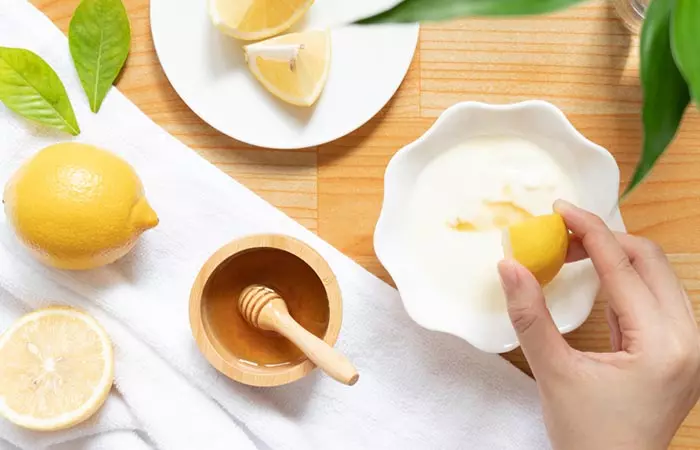
1. Honey And Lemon For Skin
Lemon juice is rich in vitamin C and citric acid. Anecdotal evidence states that lemon juice has an astringenti A substance that helps reduce bleeding from minor cuts and skin oiliness when applied as a cosmetic. effect on the skin, can help keep your skin oil-free, and minimize pores. This face mask can help control acne breakouts.
You Will Need
- The juice from half a lemon
- 1 tablespoon raw honey
- Towel
Method
- Mix the lemon juice with the honey until you get a smooth mixture.
- Wash your face with a mild cleanser and pat it dry.
- Apply this mixture onto your face. Make sure to avoid the fragile skin around your eyes.
- Leave the mixture on for about 20 minutes.
- Wash it off with warm water, followed by cool water.
- Pat your face dry with a towel.
How Often?
Once a week.
2. Honey And Apple Cider Vinegar For Skin
Milk contains lactic acid. Topical lactic acid has a gentle exfoliating and cleansing effect on your skin and improves skin texture (4). Apple cider vinegar is widely used for its skin-soothing effects. It is said to alter the skin’s pH that helps to kill bacteria. However, there is no scientific evidence to prove this effect.
You Will Need
- 1 tablespoon milk powder (or ½ teaspoon raw milk)
- 2 teaspoons apple cider vinegar
- ½ teaspoon raw honey
- Towel
Method
- Combine all the ingredients until you get a smooth mixture.
- Wash your face with a mild cleanser and pat it dry.
- Apply this mixture onto your face. Make sure to avoid the fragile skin around your eyes.
- Leave the mixture on for about 15 minutes.
- After 15 minutes, wet your fingers and gently rub the dry mask to exfoliate your skin.
- Rinse your face with cool water.
- Pat your face dry with a towel.
- Moisturize.
How Often?
Once a week.
3. Honey And Cinnamon For Skin
Cinnamon has anti-inflammatory properties. A study involving 20 patients evaluated the efficacy of cinnamon gel on mild to moderate acne. It found that cinnamon gel helped reduce acne lesionsi Abnormal tissue changes inside or outside the body, which can be benign or malignant, caused by disease or trauma. (5). Together with honey, cinnamon may help clear acne.
You Will Need
- A pinch of cinnamon powder or 2-3 drops of cinnamon essential oil
- 1 tablespoon honey
Method
- Combine the two ingredients.
- Apply the mixture to the acne lesions (as a spot treatment).
- Leave it on for 10-15 minutes.
- Wash it off.
How Often?
1-2 times a week.
Precaution: Cinnamon may cause minor skin irritation, which is common. However, ensure you do a patch test before using it on your skin.
4. Honey And Tomato For Skin
Tomatoes contain lycopene (a carotenoid responsible for its red color) (6). A study states that topical lycopene is an effective antioxidant and can prevent cell damage by inhibiting free radicals (7). Together with honey, tomato can keep your skin healthy.
You Will Need
- ½ ripe tomato
- 1 tablespoon raw honey
- Towel
Method
- Puree the tomato in a blender until it is free of lumps.
- Add honey to the puree and mix well.
- Wash your face with a mild cleanser and pat it dry.
- Apply this mixture onto your face. Make sure to avoid the fragile skin around your eyes.
- Leave the mask on for about 15 minutes.
- Rinse off with cool water.
- Pat your face dry with a towel.
How Often?
2 times a week.
5. Honey And Banana For Skin
Banana is a common ingredient used in face masks and is said to have a moisturizing effect on the skin (8). It is also an excellent base for any DIY face mask. Together with honey and lemon, this face mask can help keep your skin clear and prevent breakouts.
You Will Need
- 1 ripe banana
- 1 teaspoon raw honey
- 1 teaspoon lemon juice
- Towel
Method
- Mash the banana until it is free of lumps.
- Add the honey and lemon juice to the mashed banana.
- Wash your face with a mild cleanser and pat it dry.
- Apply this mixture onto your face. Make sure to avoid the sensitive skin around your eyes.
- Leave the mixture on for about 10-15 minutes.
- Wash your face with lukewarm water and pat dry with a towel.
How Often?
Once a week.
6. Honey And Gram Flour (Besan) For Skin
Gram flour helps to cleanse the skin and exfoliate it. It also helps to reduce excessive oil and tanning (9). This face mask can give you a clear complexion with regular use.
You Will Need
- 2 tablespoons gram flour (besan)
- 1 tablespoon raw honey
- Water
- Towel
Method
- Combine the honey and besan.
- Add some water and mix well to get a smooth and consistent paste.
- Wash your face with a mild cleanser and pat it dry.
- Apply this mixture onto your face. Make sure to avoid the fragile skin around your eyes.
- Leave the mixture on for about 30 minutes.
- Rinse the mixture off with lukewarm water.
- Pat dry with a towel.
How Often?
3 times a week.
7. Honey And Yogurt For Skin
Yogurt contains L-cysteine that can help in lightening the skin tone (10). It helps to exfoliate the skin and brighten it and also has a cooling and skin-soothing effect. This face pack is excellent for soothing irritated skin and brightening it.
You Will Need
- 2 tablespoons curd or yogurt
- 1 tablespoon raw honey
- Towel
Method
- Combine the ingredients to get a smooth mixture.
- Wash your face with a mild cleanser and pat it dry.
- Apply this mixture onto your face. Make sure to avoid the fragile skin around your eyes.
- Leave the mixture on for about 15 minutes.
- Wash the mixture off with lukewarm water.
- Pat your face dry with a towel.
How Often?
2 times a week.
8. Honey And Olive Oil For Skin
Olive oil is popularly used for oil cleansing. When massaged on the skin, it helps to clear skin pores and remove traces of dirt and impurities from your skin. In combination with honey, it can help keep your skin clear and prevent breakouts.
You Will Need
- 2 tablespoons honey
- 1 tablespoon olive oil
- Towel
Method
- Combine the ingredients until you get a smooth mixture.
- Microwave the mixture for about 20 seconds, until it is slightly warm.
- Wash your face with a mild cleanser and pat it dry.
- Apply this mixture onto your face. Make sure to avoid the fragile skin around your eyes.
- Leave the mixture on for about 5 minutes.
- Rinse the mixture off with lukewarm water and a mild cleanser.
- Pat your face dry with a towel.
How Often?
2 times a week.
Michelle, a beauty enthusiast and blogger, shared about her experience of discovering the skin benefits of raw honey masks, saying, “ I apply the honey alone as a mask before a shower, or put it on in the shower for the duration. Honey on the face alone can be drying from personal experience. It dries out easy after application. You can mix it with a touch of olive oil to add moisture. Honey also has natural sugars in it, which is moisturizing for the skin (i).”
9. Honey And Turmeric For Skin
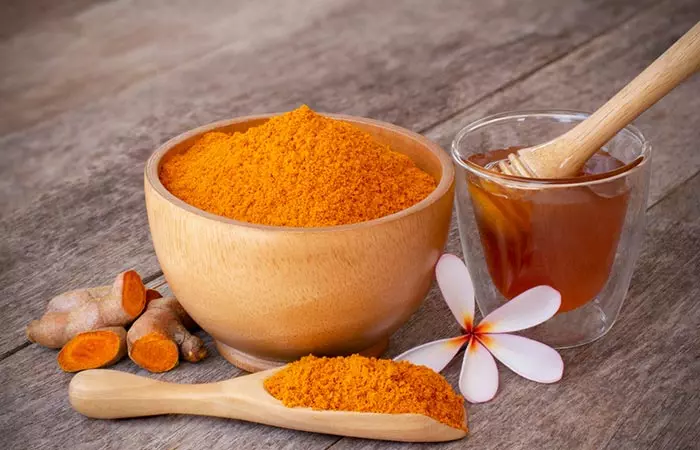
Turmeric has therapeutic benefits and can help in improving a lot of skin conditions, including acne (11). It has been used since ancient times for its antiseptic and anti-inflammatory properties. This combination can keep your skin clear, soothe acne breakouts, and brighten your skin. Honey for skin brightening has been used for centuries.
You Will Need
- 1 teaspoon turmeric
- 1 teaspoon raw honey
- 1 teaspoon yogurt
- Towel
Method
- Combine the ingredients until you get a smooth mixture.
- Wash your face with a mild cleanser and pat it dry.
- Apply this mixture onto your face. Make sure to avoid the fragile skin around your eyes.
- Leave the mixture on for about 20 minutes.
- Rinse the mixture off with lukewarm water and a mild cleanser.
- Pat your face dry with a towel.
How Often?
1-2 times a week.
10. Honey And Rosewater For Skin
Rosewater exhibits antimicrobial activity and inhibits the growth of S. aureus bacteria that cause acne and other skin issues (12).
You Will Need
- 2 teaspoons rose water
- 1 tablespoon honey
- Towel
Method
- Combine the ingredients until you get a smooth mixture.
- Wash your face with a mild cleanser and pat it dry.
- Apply this mixture onto your face. Make sure to avoid the fragile skin around your eyes.
- Leave the mixture on for about 15 minutes.
- Rinse the mixture off with lukewarm water and a mild cleanser.
- Pat your face dry with a towel.
How Often?
1- 2 times a week.
11. Honey And Sugar Scrub For Skin
The coarse texture of the sugar and honey scrub helps buff away all the dead cells on your skin’s surface. This helps keep your skin healthy and free of build-up. The scrub also readies your face for absorbing moisture and nutrients, so it would be a good idea to follow this up with a moisturizing and nourishing face mask.
You Will Need
- 2 tablespoons honey
- 3 tablespoons sugar
- 1 teaspoon olive oil
- 1 teaspoon lemon juice
- Towel
Method
- Combine the ingredients to get a coarse mixture.
- Wash your face with a mild cleanser.
- Apply the mixture to your face and gently scrub your skin in circular motions with your fingertips.
- Do this for a couple of minutes.
- Wash your face with warm water, followed by cold water.
- Pat dry with a towel.
How Often?
2-3 times a week.
12. Honey And Coconut Oil For Skin
Extra virgin coconut oil has anti-inflammatory properties and can soothe symptoms of skin conditions like psoriasis and atopic dermatitis (13). Using honey for oily skin may help balance excess oil but is not always advisable as it may aggravate acne.
You Will Need
- 1 teaspoon extra virgin coconut oil
- 1 teaspoon honey
Method
- Mix the two ingredients
- Massage the mixture on your face for 10 minutes.
- Leave it on for another 10 minutes.
- Wash your face with a mild cleanser.
- Follow up with a moisturizer.
How Often?
2 times a week.
13. Honey And Avocado For Skin
Avocado oil is rich in linoleic
and linolenic acids, along with polyunsaturated and monounsaturated fatty acids. Rat studies showed that it had excellent wound-healing abilities and could increase collagen density (14). Use this mask containing honey for skin repair.
You Will Need
- A teaspoon of avocado oil
- A teaspoon of raw honey
Method
- Mix the two ingredients.
- Massage it on your face for 10 minutes.
- Leave it for another 10 minutes.
- Wash your face with a mild cleanser.
- Follow up with a moisturizer.
How Often?
2-3 times a week.
14. Honey And Oatmeal For Skin
You can use this mix of oatmeal and honey for skin radiance and skin cleansing. Colloidal oatmeal (boiled oats) is an excellent cleansing agent for the skin. It is rich in saponins that help to remove traces of dirt and impurities from the skin. It also helps to calm your skin by reducing inflammation (15).
You Will Need
- 2 tablespoons of boiled oats
- 1 tablespoon raw honey
Method
- Mix both the ingredients to make a paste.
- Spread it evenly on your face.
- Massage for 5 minutes and then leave it for another 10 minutes.
- Wash with warm water and then with a mild cleanser.
- Follow up with a moisturizer.
How Often?
2 times a week.
15. Honey And Shea Butter For Skin
The anti-inflammatory properties of shea butter help to calm your skin, soothe skin irritation. It also contains oleic, linoleic, stearic, and palmitic fatty acids that keep your skin healthy (13). Use this mix of shea butter and honey for skin hydration.
You Will Need
- 1 tablespoon of shea butter
- 1 tablespoon of raw honey
Method
- Mix the two ingredients.
- Massage well on your face and neck.
- Leave it for 15-20 minutes.
- Wash with a mild cleanser and warm water.
How Often?
3 times a week.
16. Honey, Turmeric, And Sandalwood Face Pack For Skin
Sandalwood has anti-inflammatory and antimicrobial properties that can help with various skin issues. Research has shown that using sandalwood and honey can reduce thick and raised scars called hypertrophic scars (16). Sandalwood oil can also calm irritated skin, fight acne, and promote healthy skin (17).
You Will Need
- 1 tablespoon of honey
- 1 teaspoon of raw milk or rose water
- A pinch of sandalwood powder
- A pinch of turmeric
Method
- Mix honey and raw milk or rose water in a bowl.
- Add sandalwood powder and turmeric into the mix.
- Stir well until it forms a smooth paste.
- Apply it on your face and neck.
- Leave it on for 10 minutes.
- Rinse with a mild cleanser and warm water.
How Often?
1-2 times a week.
 Quick Tip
Quick TipHoney is considered a safe ingredient for the skin. However, you need to be cautious before using honey for your face as it may cause some unwanted skin reactions.
Side Effects Of Using Honey For Face And Skin

Raw and unadulterated honey may cause allergic reactions. Raw honey may contain traces of pollen. Hence, if you are allergic to pollen and bee venom, avoid using raw honey on your face. It may cause symptoms, such as:
- Rashes
- Watery eyes
- Wheezing
- Hives
- Sneezing
- Bumps on the skin
- Itchy throat
Before using honey on your face, do a patch test to make sure it suits you. Also, never use honey for overnight application. It is sticky, and you will not feel comfortable. It may also attract dust and other impurities and aggravate your skin condition (if any). When using honey for sensitive skin, don’t keep it on for too long. It can stick to the skin causing redness and irritation.
If you want to buy organic honey online, here are a few suggestions.
Best Honey For Face
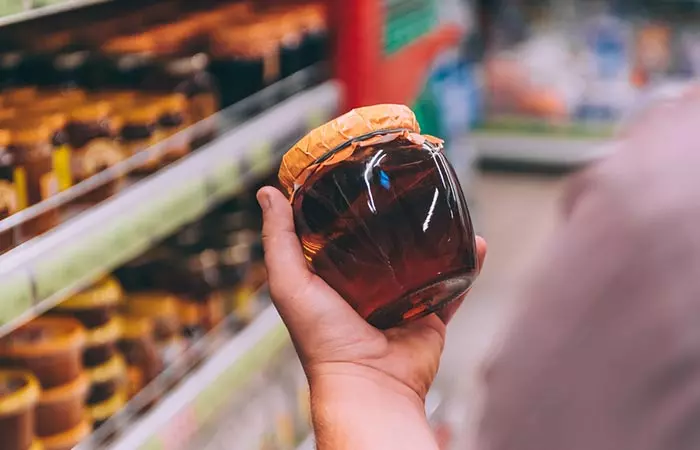
Honey benefits our skin in many ways. It can help with moisturizing, healing, and providing a natural glow when used regularly. When looking for raw honey, check the appearance of the product. It will have a cloudy appearance.
Also, raw honey crystallizes faster compared to regular honey. Hence, you need to put the bottle in warm water before using it. This is one way to identify raw and unfiltered honey.
You can buy raw honey from the local farmers or online.
Infographic: Why And How To Use Honey For Your Face
Honey has many potential benefits for your skin. It is a natural humectant with healing properties that treat wounds and infections. It also has natural antioxidants that reduce wrinkles and fine lines. Go through the infographic below to learn more about its benefits and how you can make use of it to achieve healthy and glowing skin.
Some thing wrong with infographic shortcode. please verify shortcode syntaxHoney is a nutrient-dense ingredient frequently used in home remedies for skin rejuvenation. Its antimicrobial and emollient properties make it ideal for the treatment of acne and wounds and skin moisturization. You can use honey for glowing skin in combination with other ingredients such as lemon, cinnamon, avocado, or tomato to make homemade face masks. Application of raw honey may cause side effects such as hives, watery eyes, wheezing, or an itchy throat. In case of an adverse reaction, stop its usage immediately and consult a doctor.
Frequently Asked Questions
Is it safe to apply honey on the face every day?
Yes, unless you are allergic to it.
Can you leave honey on the face overnight?
No, it may attract dust and cause breakouts.
How can I avoid bacterial contamination when using honey on my skin?
Honey inhibits bacterial growth since it is an antibacterial agent. Bacterial contamination is unlikely with the topical application of honey on the skin. However, it may be of concern if contaminated honey is ingested.
Should I be concerned about the sugar content in honey when using it on my skin?
No. While the sugar content in honey can be a dietary concern, topical application is nothing to worry about.
Can I mix honey with other ingredients to reduce stickiness?
You can mix honey with some water to reduce its stickiness. You can also mix it with rosewater, oils, and yogurt, as mentioned in the article.
Can I use honey on open wounds or cuts?
Yes. Honey has antibacterial, antioxidant, anti-inflammatory, and antiviral properties that are perfect for wound healing. They can be used in dressings for open wounds and cuts and can even help speed up the healing process (18).
How can I use honey for skin whitening?
You can mix honey with raw milk or fresh lemon juice and apply it to your face and neck for 15-20 minutes before rinsing it off. Face packs with honey help achieve a glowing, nourished complexion.
Illustration: Honey For Face And Skin: Benefits And How To Use It
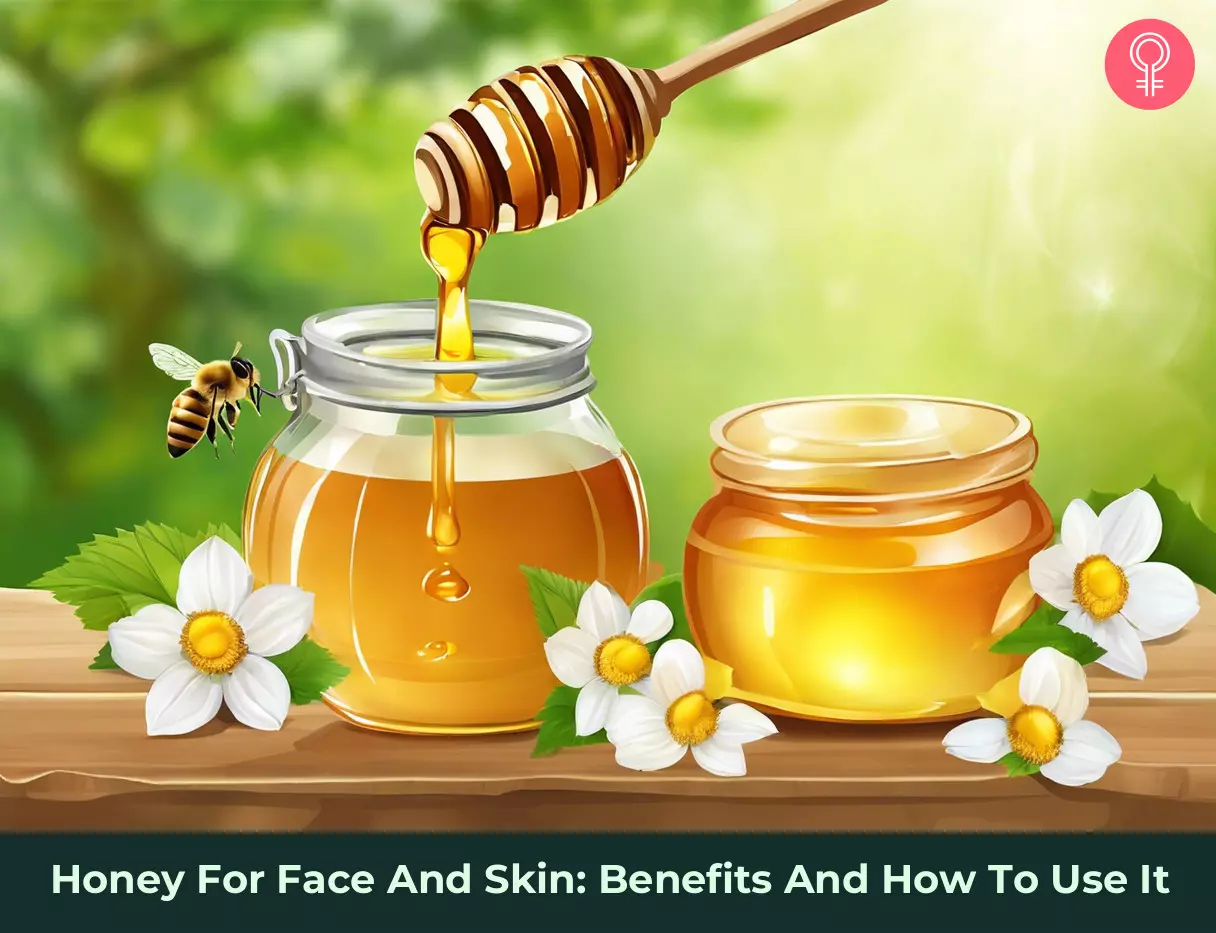
Image: Stable Diffusion/StyleCraze Design Team
Personal Experience: Source
StyleCraze's articles are interwoven with authentic personal narratives that provide depth and resonance to our content. Below are the sources of the personal accounts referenced in this article.
i. Raw manuka honey & why it’s great for your skinhttps://thebeautyendeavor.wordpress.com/2014/10/13/raw-manuka-honey-why-its-great-for-your-skin/
References
Articles on StyleCraze are backed by verified information from peer-reviewed and academic research papers, reputed organizations, research institutions, and medical associations to ensure accuracy and relevance. Read our editorial policy to learn more.
- Honey and Health: A Review of Recent Clinical Research, Pharmacognosy Research, US National Library of Medicine, National Institutes of Health.
https://www.ncbi.nlm.nih.gov/pmc/articles/PMC5424551/ - Honey: A Therapeutic Agent for Disorders of the Skin, Central Asian Journal of Global Health, US National Library of Medicine, National Institutes of Health.
https://www.ncbi.nlm.nih.gov/pmc/articles/PMC5661189/ - Honey in dermatology and skin care: a review., Journal of Cosmetic Dermatology, US National Library of Medicine, National Institutes of Health.
https://pubmed.ncbi.nlm.nih.gov/24305429/ - Epidermal and dermal effects of topical lactic acid. Journal of The American Academy of Dermatology, US National Library of Medicine, National Institutes of Health.
https://pubmed.ncbi.nlm.nih.gov/8784274/ - Efficacy of topical cinnamon gel for the treatment of facial acne vulgaris: A preliminary study, Biomedical Research and Therapy, BioMedPress.
http://bmrat.org/index.php/BMRAT/article/view/515 - An Update on the Health Effects of Tomato Lycopene, Annual Review of Food Science and Technology, US National Library of Medicine, National Institutes of Health.
https://www.ncbi.nlm.nih.gov/pmc/articles/PMC3850026/ - Antioxidant activity of topically applied lycopene. Journal of European Academy of Dermatology and Venereology, US National Library of Medicine, National Institutes of Health.
https://pubmed.ncbi.nlm.nih.gov/14678532/ - Traditional and Medicinal Uses of Banana, Journal of Pharmacognosy and Phytochemistry.
https://www.phytojournal.com/vol1Issue3/Issue_sept_2012/9.1.pdf - In-House Preparation and Standardization of Herbal Face Pack, The Open Dermatology Journal, Bentham Open,
https://www.semanticscholar.org/paper/In-House-Preparation-and-Standardization-of-Herbal-Pal-Pal/e47d35a89c587c622323b5a7fc4e30f55d5be6df?p2df - Systemic skin whitening/lightening agents: What is the evidence? Indian Journal of Dermatology, Venereology and Leprology, ResearchGate.
https://www.researchgate.net/publication/258214624_Systemic_skin_whiteninglightening_agents_What_is_the_evidence - Effects of Turmeric (Curcuma longa) on Skin Health: A Systematic Review of the Clinical Evidence., Phytotherapy Research, US National Library of Medicine, National Institutes of Health.
https://pubmed.ncbi.nlm.nih.gov/27213821/ - Pharmacological Effects of Rosa Damascena, Iranian Journal of Basic Medical Sciences, US National Library of Medicine, National Institutes of Health.
https://www.ncbi.nlm.nih.gov/pmc/articles/PMC3586833/ - Anti-Inflammatory and Skin Barrier Repair Effects of Topical Application of Some Plant Oils, International Journal of Molecular Sciences, US National Library of Medicine, National Institutes of Health.
https://www.ncbi.nlm.nih.gov/pmc/articles/PMC5796020/ - Effect of Semisolid Formulation of Persea Americana Mill (Avocado) Oil on Wound Healing in Rats, Evidence-based Complementary and Alternative Medicine, US National Library of Medicine, National Institutes of Health.
https://www.ncbi.nlm.nih.gov/pmc/articles/PMC3614059/ - Colloidal oatmeal: history, chemistry and clinical properties. Journal of Drugs in Dermatology, US National Library of Medicine, National Institutes of Health.
https://pubmed.ncbi.nlm.nih.gov/17373175/ - Burn wound healing potential of honey, sandal wood, calendula and cooling with tap water-a comparative study on wistar rats
https://jcdr.net/article_fulltext.asp?issn=0973-709x&year=2018&volume=12&issue=10&page=FC10&issn=0973-709x&id=12125 - Sandalwood album oil as a botanical therapeutic in dermatology
https://pubmed.ncbi.nlm.nih.gov/29344319/ - Evidence For Clinical Use Of Honey In Wound Healing As An Anti-Bacterial, Anti-Inflammatory Anti-Oxidant And Anti-Viral Agent: A Review
https://www.ncbi.nlm.nih.gov/pmc/articles/PMC3941901/#:~:text=Honey%20has%20anti%2Doxidant%2C%20anti,content%20and%20hydrogen%20peroxide%20content.
Watch this video to find out how including honey in your skin care routine might be a game changer. Get a better understanding of the plethora of benefits that honey brings to the skin.
Read full bio of Dr. Vindhya L Veerula
Read full bio of Ramona Sinha
Read full bio of Anjali Sayee
Read full bio of Krati Darak







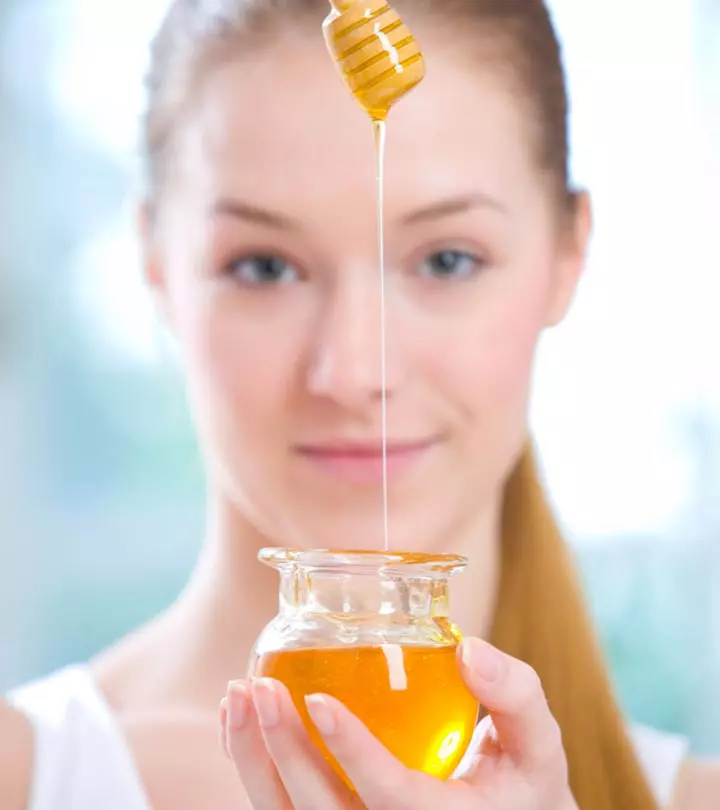
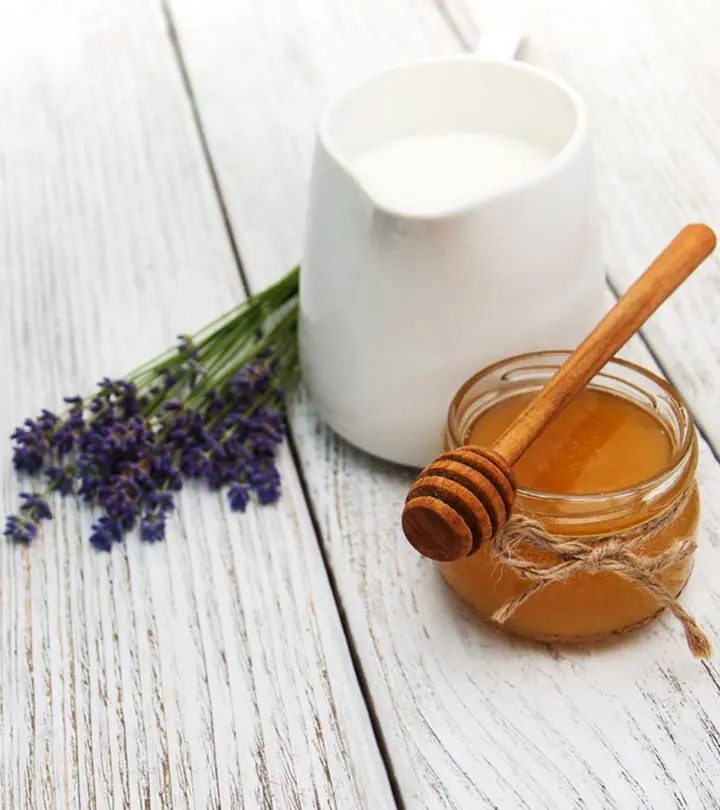

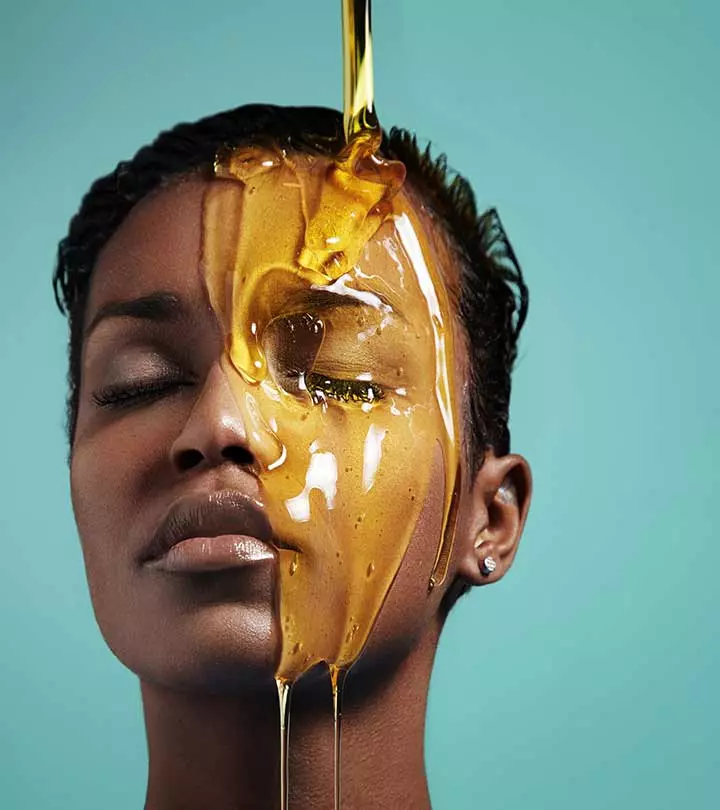
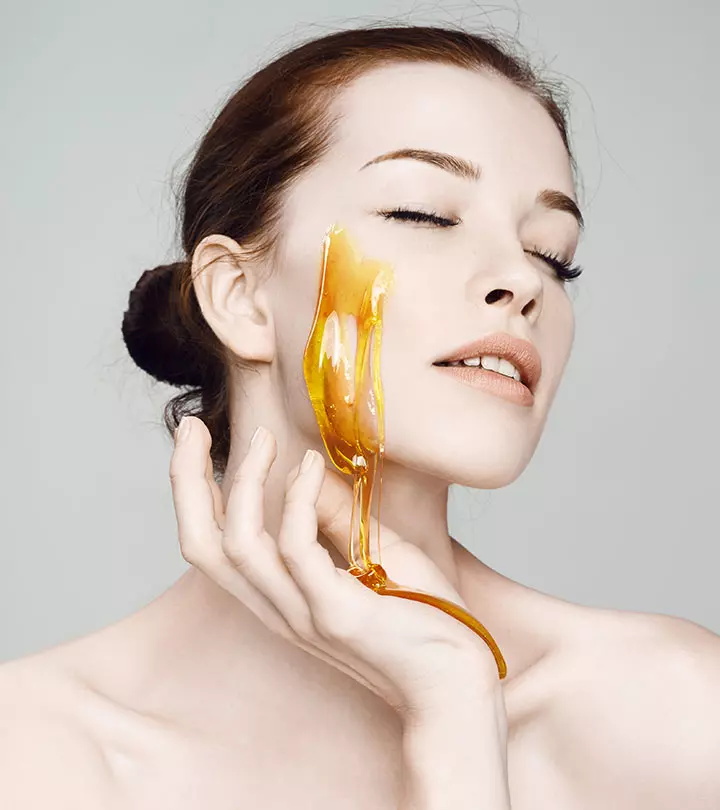
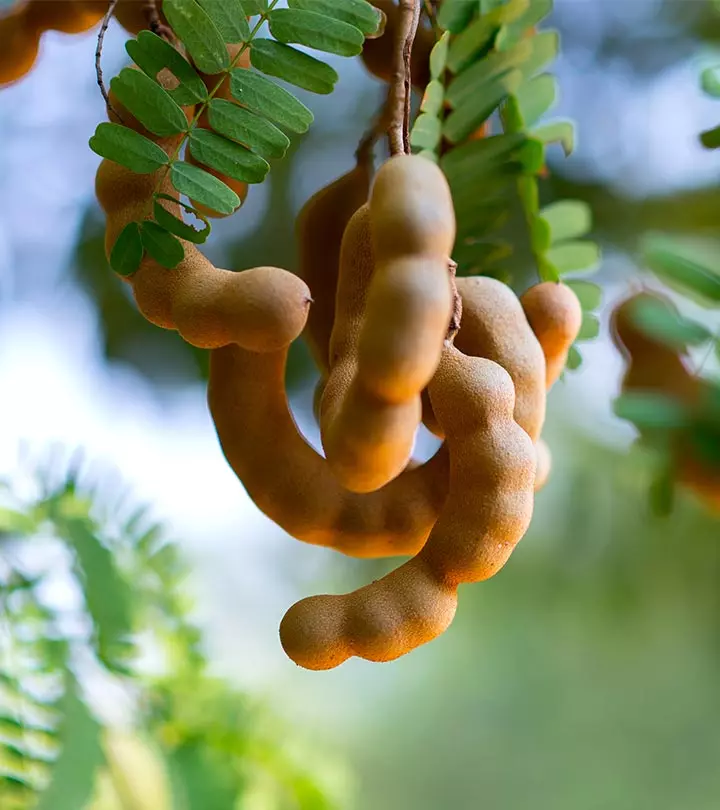
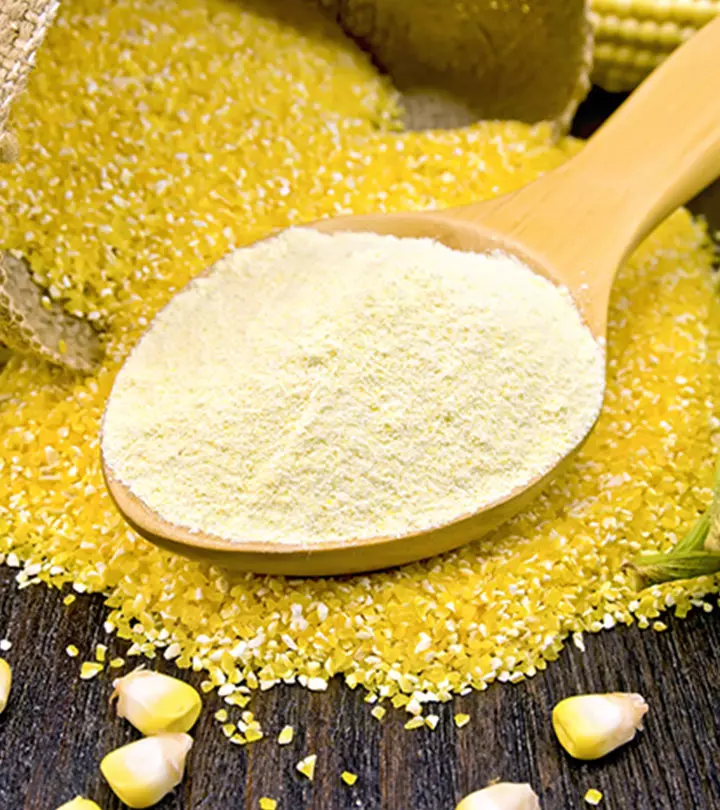
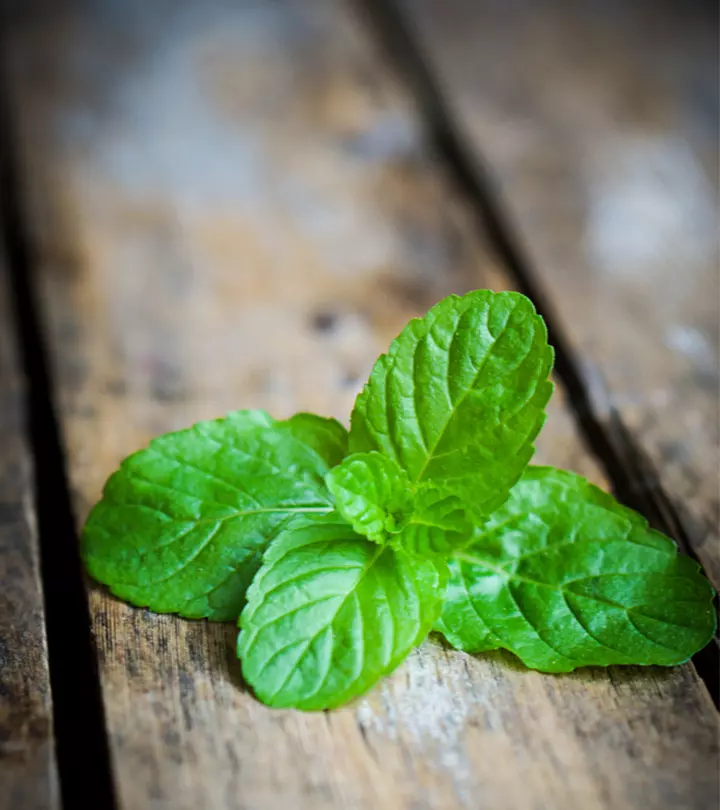
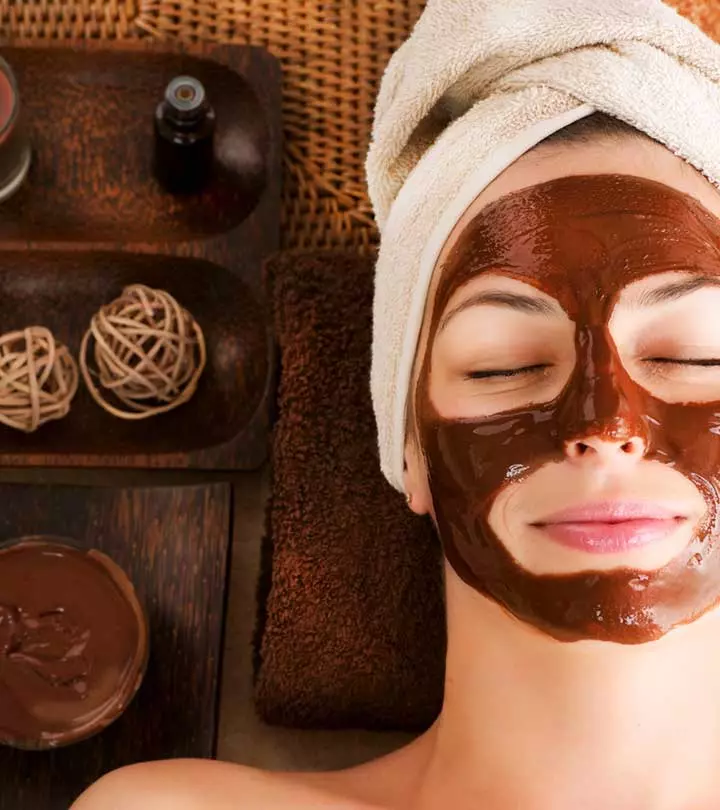



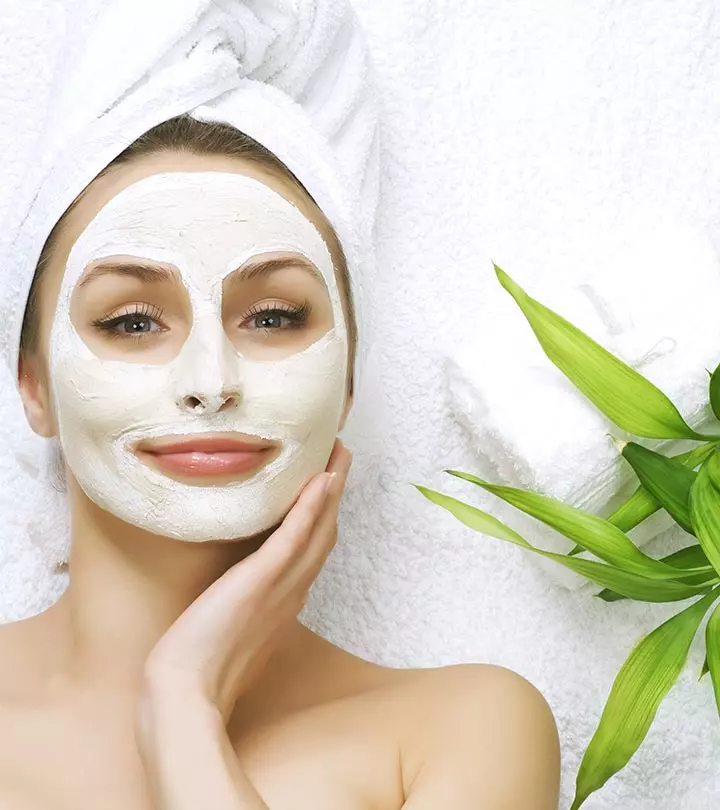

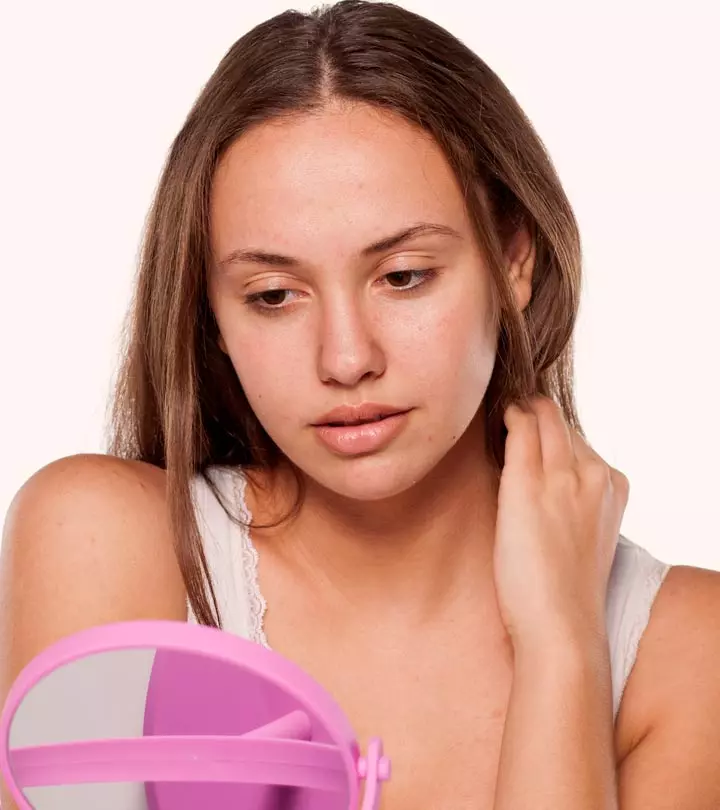
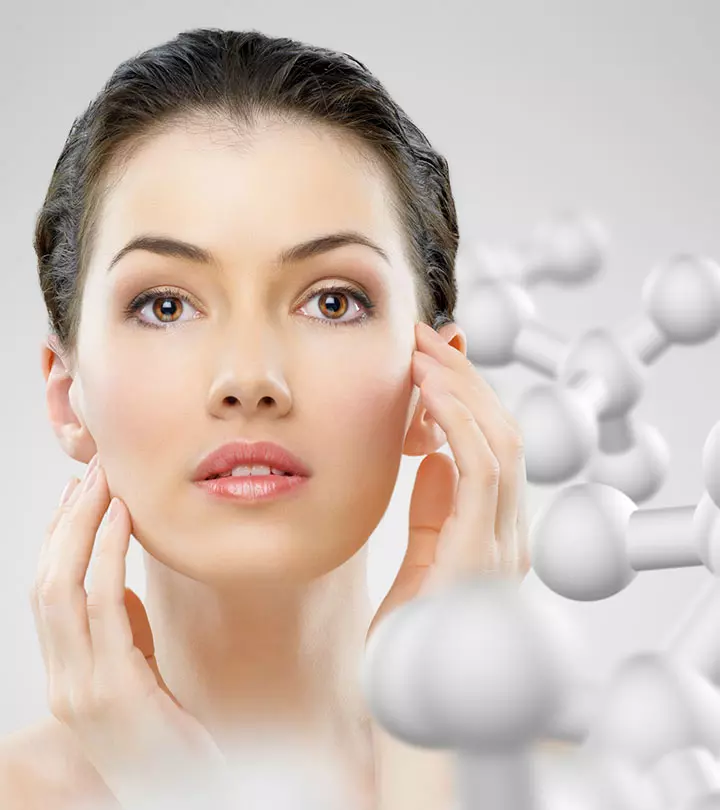

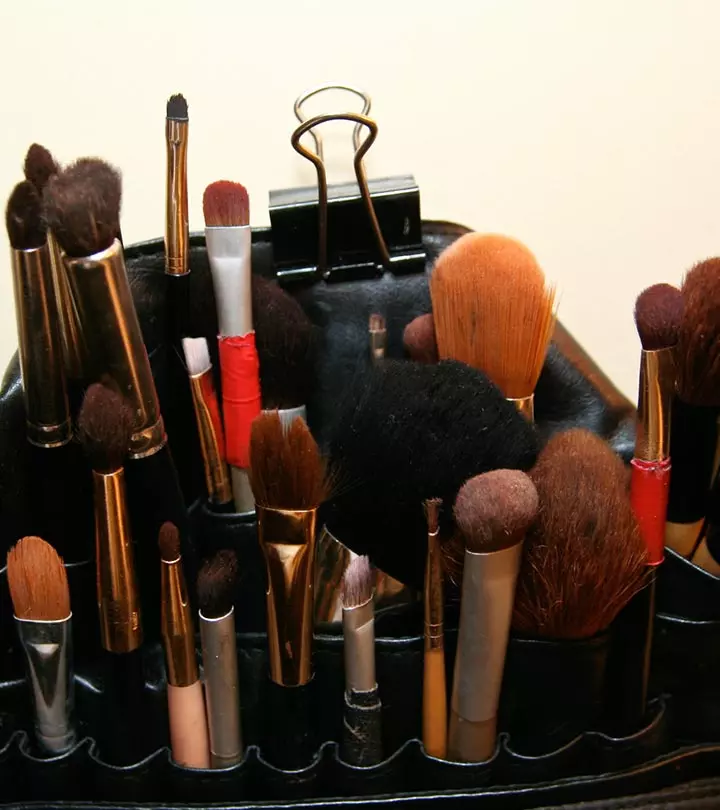
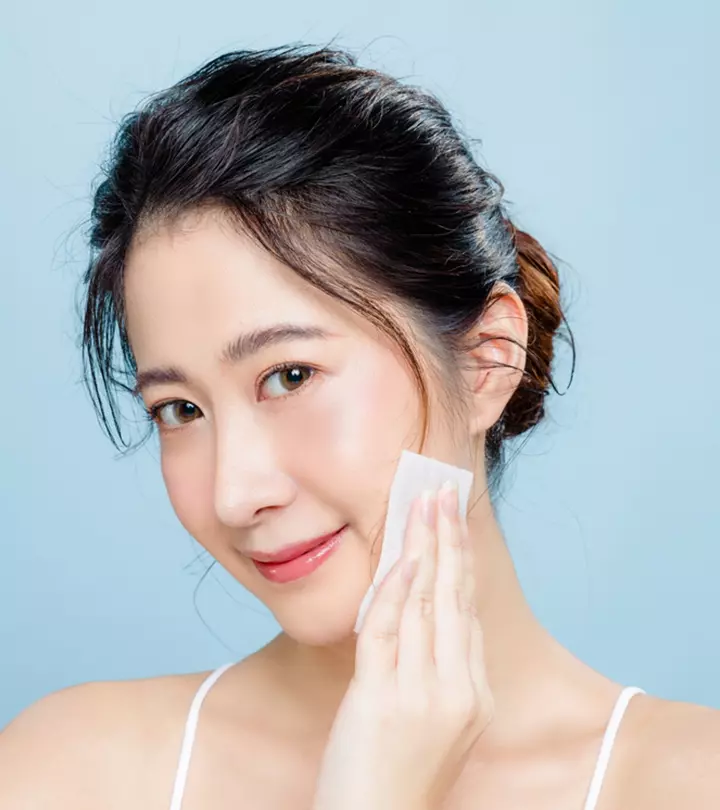

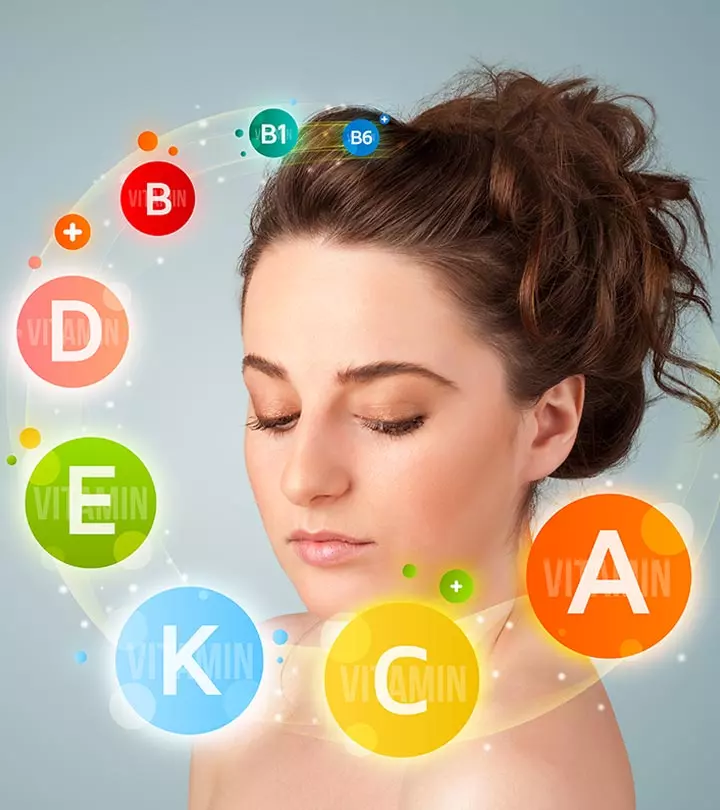
Community Experiences
Join the conversation and become a part of our empowering community! Share your stories, experiences, and insights to connect with other beauty, lifestyle, and health enthusiasts.